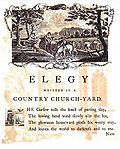Portal:Poetry
Welcome to the Poetry Portal


Poetry (a term derived from the Greek word poiesis, "making"), also called verse, is a form of literature that uses aesthetic and often rhythmic qualities of language − such as phonaesthetics, sound symbolism, and metre − to evoke meanings in addition to, or in place of, a prosaic ostensible meaning. A poem is a literary composition, written by a poet, using this principle.
Poetry has a long and varied history, evolving differentially across the globe. It dates back at least to prehistoric times with hunting poetry in Africa and to panegyric and elegiac court poetry of the empires of the Nile, Niger, and Volta River valleys. Some of the earliest written poetry in Africa occurs among the Pyramid Texts written during the 25th century BCE. The earliest surviving Western Asian epic poem, the Epic of Gilgamesh, was written in the Sumerian language.
Early poems in the Eurasian continent evolved from folk songs such as the Chinese Shijing as well as from religious hymns (the Sanskrit Rigveda, the Zoroastrian Gathas, the Hurrian songs, and the Hebrew Psalms); or from a need to retell oral epics, as with the Egyptian Story of Sinuhe, Indian epic poetry, and the Homeric epics, the Iliad and the Odyssey. (Full article...)
Selected article

Elegy Written in a Country Churchyard is a poem by Thomas Gray, completed in 1750 and first published in 1751. The poem’s origins are unknown, but it was partly inspired by Gray’s thoughts following the death of the poet Richard West in 1742. Originally titled Stanza's Wrote in a Country Church-Yard, the poem was completed when Gray was living near St Giles' parish church at Stoke Poges. It was sent to his friend Horace Walpole, who popularised the poem among London literary circles. Gray was eventually forced to publish the work on 15 February 1751, to pre-empt a magazine publisher from printing an unlicensed copy of the poem.
The poem is an elegy in name but not in form; it employs a style similar to that of contemporary odes, but it embodies a meditation on death, and remembrance after death. The poem argues that the remembrance can be good and bad, and the narrator finds comfort in pondering the lives of the obscure rustics buried in the churchyard. The two versions of the poem, Stanzas and Elegy, approach death differently; the first contains a stoic response to death, but the final version contains an epitaph which serves to repress the narrator's fear of dying. With its discussion of, and focus on, the obscure and the known, the poem has possible political ramifications, but it does not make any definite claims on politics to be more universal in its approach to life and death.
The poem quickly became popular. It was printed many times, translated into many languages, and praised by critics even after Gray's other poetry had fallen out of favour. Later critics tended to praise its language and universal aspects, but some felt the ending was unconvincing, failing to resolve the questions the poem raised; or that the poem did not do enough to present a political statement that would serve to help the obscure rustic poor who form its central image. (Full article...)
Selected image
Poetry WikiProject

Selected biography

Masaoka Shiki (正岡 子規, October 14, 1867 – September 19, 1902), pen-name of Masaoka Noboru (正岡 升), was a Japanese poet, author, and literary critic in Meiji period Japan. Shiki is regarded as a major figure in the development of modern haiku poetry, credited with writing nearly 20,000 stanzas during his short life. He also wrote on reform of tanka poetry.
Some consider Shiki to be one of the four great haiku masters, the others being Matsuo Bashō, Yosa Buson, and Kobayashi Issa.
Did you know (auto-generated) -

- ... that Rabia Balkhi is the first known Persian woman poet?
- ... that the Three Bards are the most celebrated poets in the history of Polish literature?
- ... that known books bound in human skin include a highwayman's memoirs bound in his own skin, a novel about a man being left by his lesbian wife, and a BDSM erotic poem?
- ... that Isabella Correa was one of the few Jewish women poets active in the Netherlands before the 19th century?
- ... that Katharina Konradi, a soprano born in Kyrgyzstan, made a recording of lieder with pianist Gerold Huber including settings by Lori Laitman of children's poems written in Terezin?
- ... that Brian Herbert, the son of Frank Herbert, may have left a poem out of a collection of his father's poetry because it was "too racy"?
Selected poem
| Poetry by Marianne Moore |
|---|
|
I, too, dislike it: there are things that are important |
Related portals
Topics
Recognized content
Categories
Associated Wikimedia
The following Wikimedia Foundation sister projects provide more on this subject:
-
Commons
Free media repository -
Wikibooks
Free textbooks and manuals -
Wikidata
Free knowledge base -
Wikinews
Free-content news -
Wikiquote
Collection of quotations -
Wikisource
Free-content library -
Wikiversity
Free learning tools -
Wiktionary
Dictionary and thesaurus






















